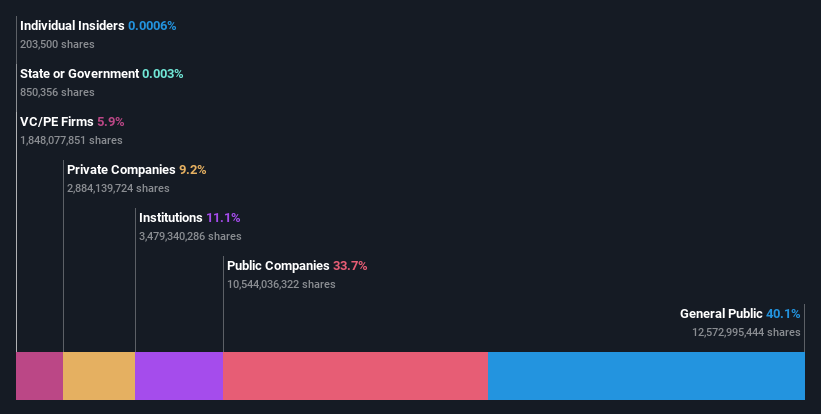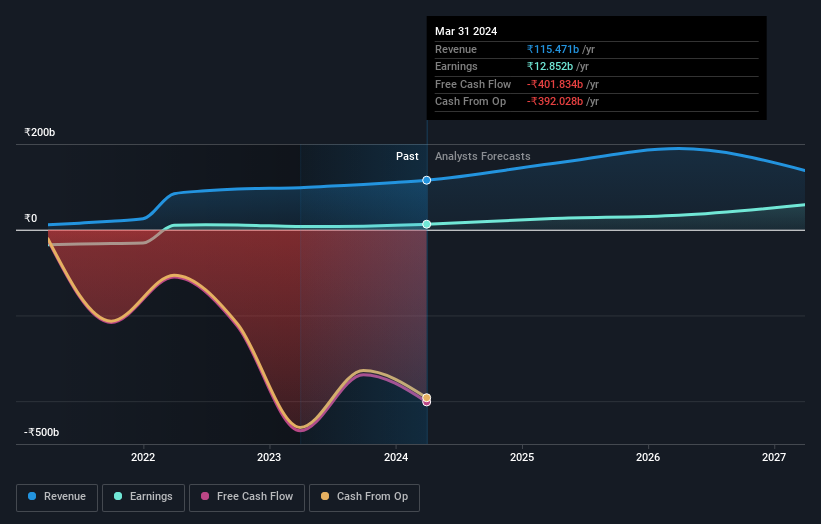Stock Analysis
Individual investors are Yes Bank Limited's (NSE:YESBANK) biggest owners and were hit after market cap dropped ₹77b

Key Insights
- Significant control over Yes Bank by individual investors implies that the general public has more power to influence management and governance-related decisions
- A total of 7 investors have a majority stake in the company with 51% ownership
- Institutions own 11% of Yes Bank
A look at the shareholders of Yes Bank Limited (NSE:YESBANK) can tell us which group is most powerful. And the group that holds the biggest piece of the pie are individual investors with 40% ownership. Put another way, the group faces the maximum upside potential (or downside risk).
As market cap fell to ₹705b last week, individual investors would have faced the highest losses than any other shareholder groups of the company.
Let's take a closer look to see what the different types of shareholders can tell us about Yes Bank.
See our latest analysis for Yes Bank

What Does The Institutional Ownership Tell Us About Yes Bank?
Institutional investors commonly compare their own returns to the returns of a commonly followed index. So they generally do consider buying larger companies that are included in the relevant benchmark index.
We can see that Yes Bank does have institutional investors; and they hold a good portion of the company's stock. This can indicate that the company has a certain degree of credibility in the investment community. However, it is best to be wary of relying on the supposed validation that comes with institutional investors. They too, get it wrong sometimes. If multiple institutions change their view on a stock at the same time, you could see the share price drop fast. It's therefore worth looking at Yes Bank's earnings history below. Of course, the future is what really matters.

Yes Bank is not owned by hedge funds. Looking at our data, we can see that the largest shareholder is State Bank of India with 24% of shares outstanding. For context, the second largest shareholder holds about 9.2% of the shares outstanding, followed by an ownership of 5.9% by the third-largest shareholder.
We did some more digging and found that 7 of the top shareholders account for roughly 51% of the register, implying that along with larger shareholders, there are a few smaller shareholders, thereby balancing out each others interests somewhat.
While studying institutional ownership for a company can add value to your research, it is also a good practice to research analyst recommendations to get a deeper understand of a stock's expected performance. There are plenty of analysts covering the stock, so it might be worth seeing what they are forecasting, too.
Insider Ownership Of Yes Bank
The definition of an insider can differ slightly between different countries, but members of the board of directors always count. Company management run the business, but the CEO will answer to the board, even if he or she is a member of it.
I generally consider insider ownership to be a good thing. However, on some occasions it makes it more difficult for other shareholders to hold the board accountable for decisions.
Our most recent data indicates that insiders own less than 1% of Yes Bank Limited. However, it's possible that insiders might have an indirect interest through a more complex structure. It is a very large company, so it would be surprising to see insiders own a large proportion of the company. Though their holding amounts to less than 1%, we can see that board members collectively own ₹4.6m worth of shares (at current prices). It is always good to see at least some insider ownership, but it might be worth checking if those insiders have been selling.
General Public Ownership
The general public, who are usually individual investors, hold a 40% stake in Yes Bank. While this size of ownership may not be enough to sway a policy decision in their favour, they can still make a collective impact on company policies.
Private Equity Ownership
With an ownership of 5.9%, private equity firms are in a position to play a role in shaping corporate strategy with a focus on value creation. Some might like this, because private equity are sometimes activists who hold management accountable. But other times, private equity is selling out, having taking the company public.
Private Company Ownership
It seems that Private Companies own 9.2%, of the Yes Bank stock. Private companies may be related parties. Sometimes insiders have an interest in a public company through a holding in a private company, rather than in their own capacity as an individual. While it's hard to draw any broad stroke conclusions, it is worth noting as an area for further research.
Public Company Ownership
We can see that public companies hold 34% of the Yes Bank shares on issue. We can't be certain but it is quite possible this is a strategic stake. The businesses may be similar, or work together.
Next Steps:
I find it very interesting to look at who exactly owns a company. But to truly gain insight, we need to consider other information, too. Take risks for example - Yes Bank has 1 warning sign we think you should be aware of.
Ultimately the future is most important. You can access this free report on analyst forecasts for the company.
NB: Figures in this article are calculated using data from the last twelve months, which refer to the 12-month period ending on the last date of the month the financial statement is dated. This may not be consistent with full year annual report figures.
Valuation is complex, but we're helping make it simple.
Find out whether Yes Bank is potentially over or undervalued by checking out our comprehensive analysis, which includes fair value estimates, risks and warnings, dividends, insider transactions and financial health.
View the Free AnalysisHave feedback on this article? Concerned about the content? Get in touch with us directly. Alternatively, email editorial-team (at) simplywallst.com.
This article by Simply Wall St is general in nature. We provide commentary based on historical data and analyst forecasts only using an unbiased methodology and our articles are not intended to be financial advice. It does not constitute a recommendation to buy or sell any stock, and does not take account of your objectives, or your financial situation. We aim to bring you long-term focused analysis driven by fundamental data. Note that our analysis may not factor in the latest price-sensitive company announcements or qualitative material. Simply Wall St has no position in any stocks mentioned.
About NSEI:YESBANK
Yes Bank
Provides various banking and financial products and services primarily in India.
Solid track record with excellent balance sheet.


